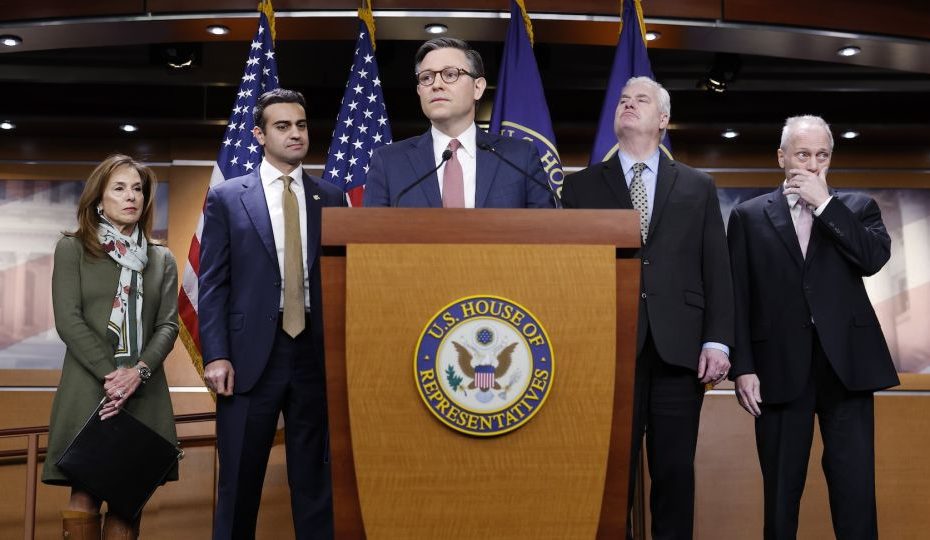The speaker Mike Johnson's budget plan is in trouble, because at the last minute several Gop-hardliners are looking for changes that can risk the support of the central center of the party's plans of leadership to President Donald Trump's agenda in the Congress to start.
Only a few hours after the compromis plan of the Gop house was released, the tax hawks in the room was listed to call for steeper cutbacks beyond the current reduction goal of $ 1.5 trillion for ten years. But the size of those cutting is already difficult for some Gop -Centrists to swallow, with republicans, including Rep. Don Bacon from Nebraska, still not willing to say whether they support cuts of that size.
House budget chairman Jodey Arrington, a Republican from Texas, projects trust. But given the return of Gop Hardliners, it is not clear whether the plan will free up an important voice from the committee on Thursday, let alone a floor voice towards the end of the month.
“From now on the voices are not there,” said Rep. Andy Ogles, a Republican from Tennessee and member of the House Freedom Caucus, from CNN when he was asked what level of cuts it would take to win his voice. “As it looks now, I think it's a shortage … But it's work in progress, and we continue to work on it.”
Rep. Ralph Norman, a Republican in South Carolina who participates in the house budget committee that will vote on the measure on Thursday, refused to say whether he would support this and said that he wants to guarantee that the final account will include the policy, such as work requirements for Medicaid, as well as An anti-red tape invoice called the Reins Act. Three other members of that panel – rep. Chip Roy from Texas, Tom McClintock from California and Andrew Clyde from Georgia – would not answer if asked how they would vote on Thursday. A fourth member, rep. Ben Cline van Virginia, said he is a 'lean yes'.
“You will find out tomorrow,” Clyde said when Wednesday was asked how he would vote on Thursday.
Some indicated that conservatives could change the measure during Thursday's Markup, although they refused to offer details. Rep. Scott Perry, a Republican from Pennsylvania and member of the House Freedom Caucus that is not on the budget panel, suggested that changes could be made on Thursday during the Markup, although he would not offer more details.
“There is always room for improvement,” said Perry. “We are not ready yet.”
The return of Gop Hardliners is sharp despite weeks of negotiations behind the scenes between Johnson, his leadership team and the right flank of the conference. Rep. Eric Burlison of Missouri called the spending reductions that target “pathetic” and said he believes that there are at least half a dozen republicans who agree and would resist the plan on the floor. That number of Johnson's razor-dunne margins is sufficient to refuel the bill.
Rep. Eli Crane, a Republican from Arizona and one of his freedom scaucus opposite, added: “I am not happy with the number of cuts.” And another, rep. Andy Biggs, also from Arizona, said CNN: “I am still studying it. I bet you can no longer say what the real numbers are more than I can. “
But Republican allies of leadership believe that the budget measure will expire and that it represents a real compromise in the conference.
“The fact that there are some pain points at both ends of the conference, I think, shows that we are too targeted,” said Rep. Dusty Johnson from South Dakota, who is part of the negotiations.
He said: “I think we'll continue with the legitimate worries that people are focusing, and I think we are really well positioned for success.”
The budget plan requires that Republicans reduce at least $ 1.5 trillion in mandatory expenses, for a purpose of $ 2 trillion. But many conservatives say that they want to see a specific target of $ 2 trillion, otherwise say that extra half-billion will not happen in austerity.
The reach of that level of cuts will probably require that republicans find savings in Medicaid, making some central republicans uncomfortable. And some are frustrated that ultra -conservatives demanded changes in the previous measure, which speaker Johnson had explained to GOP legislators earlier this year.
Bacon said he would “keep my powder drying” about how he would vote on the resolution, but said he preferred the earlier budget plan of Johnson, which had more modest cuts.
“I think the speaker had a better plan,” he said, referring to Johnson's first proposal of about $ 1 trillion to cuts. “I wish they would listen to him, the majority leader and the whip and the chairman. They all say the same thing. But we had a few ways of guys who know better than all leadership, “Bacon told CNN laughing.
Bacon added that he believes that Trump does not want to “undermine medicaid” and believes that Gop leadership will adhere to it.
Rep. Nick Lalota, a Republican from New York who met Johnson earlier on Wednesday, told CNN that Republicans should be careful when it comes to steep cuts on Medicaid and other programs.
“We must be careful,” said Lalota. “I mean, the president said he does not want to cut Medicaid, and now it is up to us in the house and the senate to find out how your pen can actually put on paper about these important issues.”
CNN's Annie Grayer, Haley Talbot, Jenna Monnin and Sarah Davis contributed to this report.
For more CNN news and newsletters create an account on CNN.com

